Joon Maeng 430 cubic inch LS7 makes over 1100 HP using Racing only 20w-50 Synthetic
Written by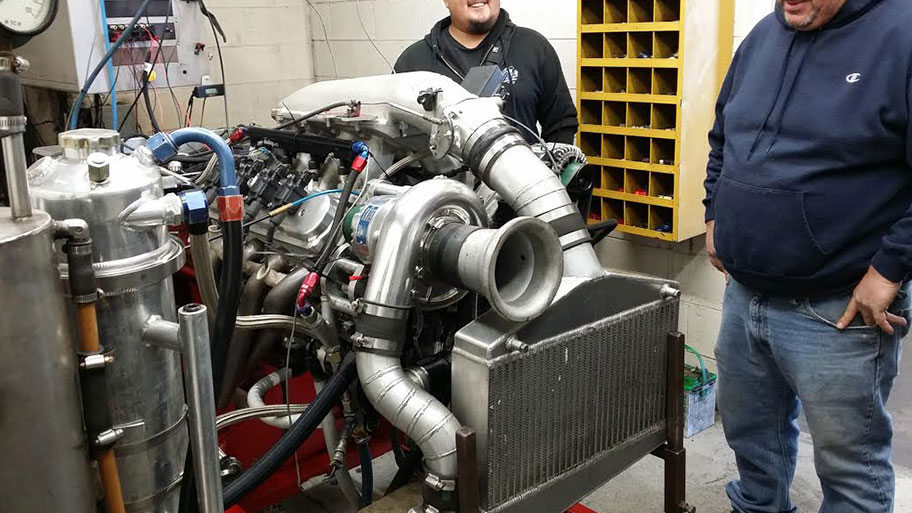 Joon Maeng 430 cubic inch LS7 makes over 1100 HP using Racing only 20w-50 Synthetic
Joon Maeng 430 cubic inch LS7 makes over 1100 HP using Racing only 20w-50 Synthetic
Joon Maeng engine LS7 430 cubic inch Duttweiler performance built, produces over 1200, using Lucas Oil 20w-50 Racing Only Synthetic
Written by Lucas Oil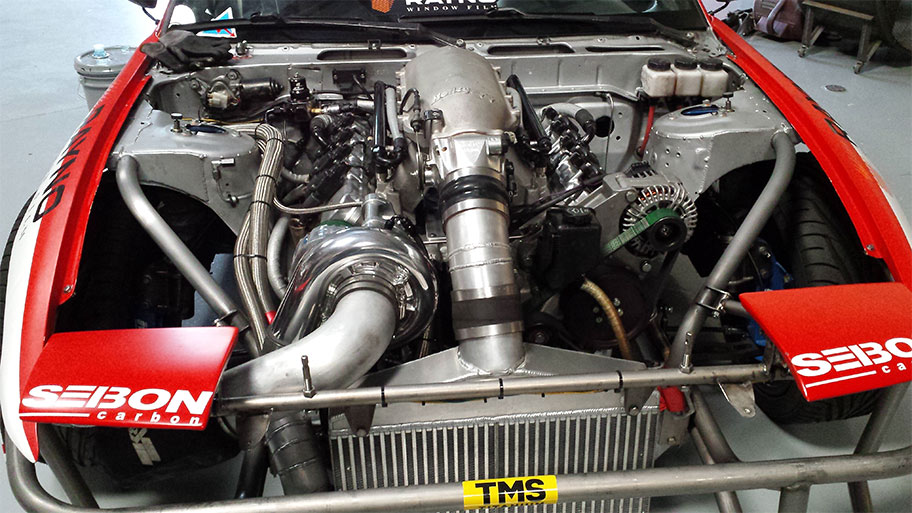
Lucas Oil Products has developed many new and innovative products in 2009. One reason for our successful launching of these products is the building of our new state of the art laboratory. Our new laboratory was completed in October of 2008. Since that time we have improved our testing capabilities significantly. When we develop a new product we carefully choose the base oils and additive systems to create the highest quality and highest performing lubricant/fuel treatment. Our technical staff has a tremendous amount of research and development experience and we use this experience to remain the leader in the aftermarket and fully compounded arena. We prid e ourselves in not only meeting specifications but exceeding them. We have the capability of measuring kinematic viscosity at 40 and 100°C, determining flash points of extremely flammable, flammable, and combustible materials, determining metals in new and used oils with our X-Ray Florescence. We also use Infrared spectroscopy for quality control, technical service, reverse engineering and new product development. We additionally have foam testing capabilities, cold temperature testing capabilities for multi-grade engine oils and have a state of the art table top density meter to determine pounds per gallons of finished products and incoming raw materials. Quality is the # 1 priority here at Lucas Oil Products. If it is Lucas, it works!
New Products
- Lucas Tool Box Buddy, Aerosol
- Lucas Chain Lube, Aerosol
- Multi-Vehicle ATF
- Power Steering Fluid with Conditioners
- ATF Conditioner
- 5 wt, 10 wt, 15 wt and 20 wt Motorcycle Fork Oils
- S1 (2.5 wt) and S2 (5 wt) Racing Suspension Fluids
- L-9, L-10 Racing Gear Oils
- Synthetic G-3 Racing Grease
- Synthetic SAE 50 Air-Cooled V-Twin Motorcycle Oil
- Deep CleanTM Fuel System Cleaner
- Synthetic SAE 5W-40 API CJ-4/SM Heavy Duty Diesel Engine Oil
Mihovetz PSCA Pro Street Twin Turbo Charged Cobra Mustang
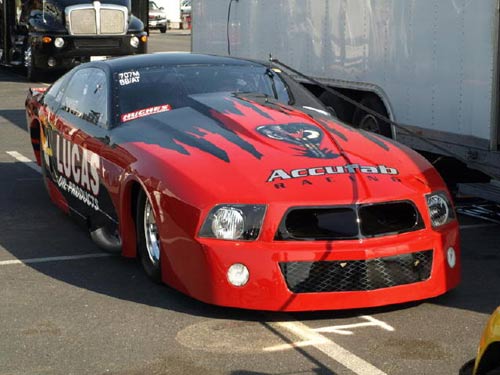
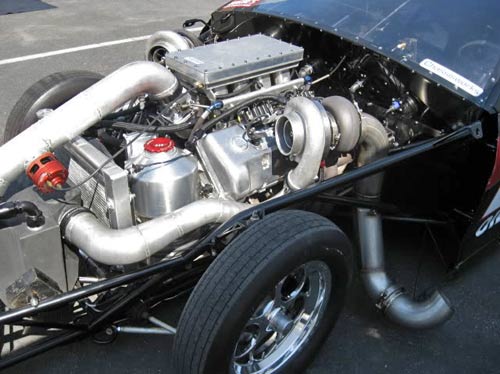
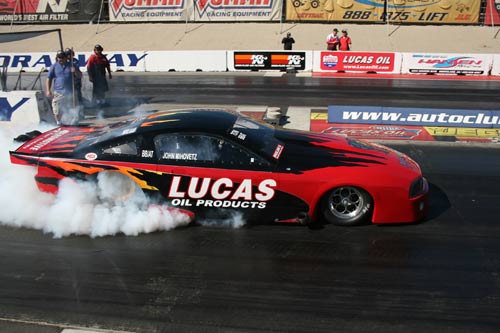
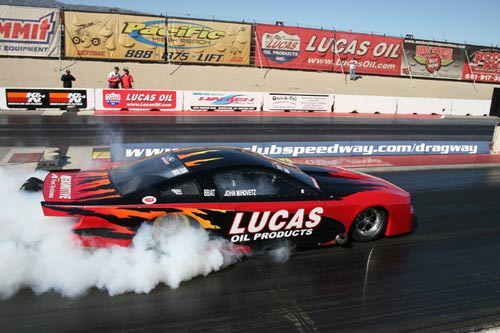
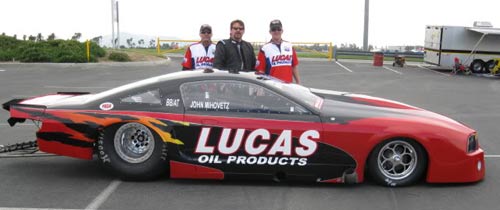
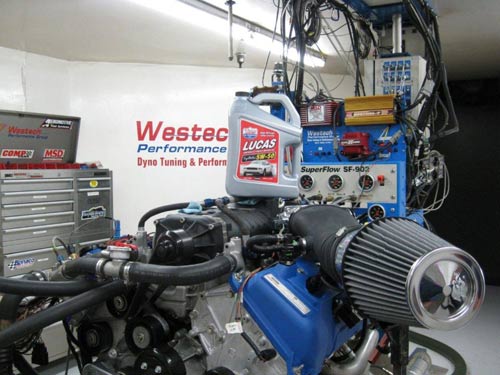
Testing a new potential blend. The factory Cobra Jet Engine has been factory filled with a 5W-50 Synthetic. Lucas Oil has developed this to Ford specifications. In our intial testing several months ago with a similar engine utilizing a Kenne Bell Supercharger, we ran this 5W-50 Synthetic Oil at up to 1200 Horse Power with great results.
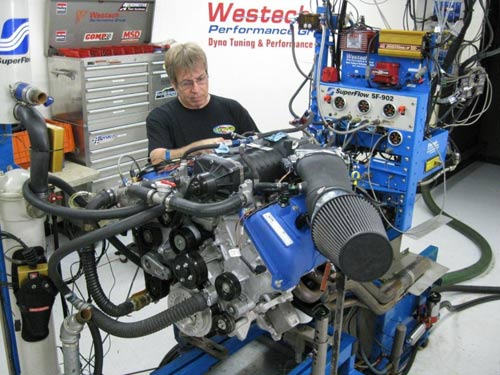
Fred wiring the Cobra Jet Engine. Fred also assembles the race engines at AccuFab which powers Mihovetz Mustang into the low 6.0 second range at over 230 MPH.
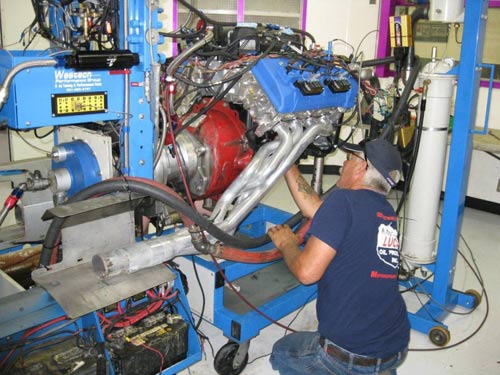
Trying some different size headers.
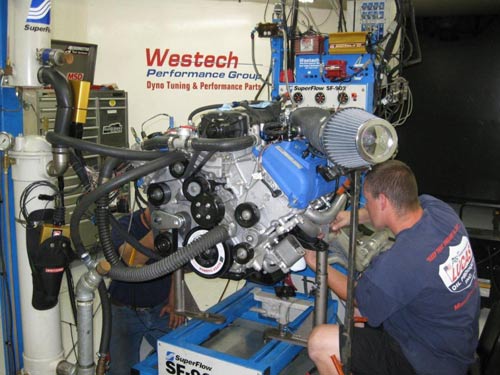
Final prep on this Factory Cobra Jet
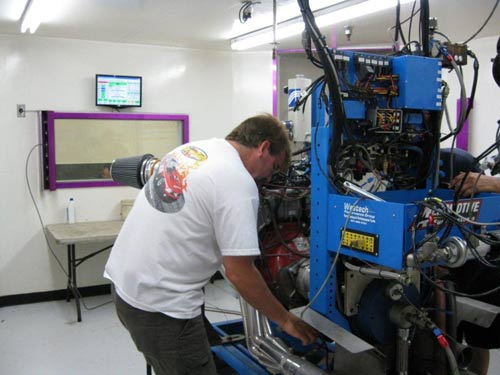
John Mihovetz owner of AccuFab Performance, enjoying another day on the dyno at Westech always looking to improve on performance on these high tech double overhead cam monsters.

An Article from www.Wired2Fish.com
By Jason Sealock with Jason Baggett
Safeguard™ Ethanol Fuel Conditioner with Stabilizers Fuel Treatment 10576 Sputtering. Spitting. Choking. No Power. The motor refused to muster up the strength to get the 20-foot bass boat up on plane. It was more like a tow boat dingy than a bass fishing machine. The angler was confused. He’d been meticulous about care for the engine and the boat.
The boat raced down the lake. The gentle breeze made for the perfect bow lift and the boat was roaring at full tilt on the way to the first stop during practice for the Central Open on Lake Lewisville. In a split second the boat lurched and started pushing water in less than 50 yards. It was like the lower unit was thrown but the boat could still get on pad although barely able to touch 3,500 RPM.
Sound like an old boat and old motor. Well it wasn’t the condition of the motor or boat at all that caused these woes. It was the well maintained boat and motor of Bassmaster Central Open pro Jason Baggett of Mansfield, Ark. The little gremlin in the outboard was a relatively misunderstood culprit called Ethanol.
When we reported about the new E-15 gas laws coming down the pipe last January, we were anticipating more problems for fishing boat owners. Ethanol is not your friend if you own a fishing boat or pretty much anything that consumes gas that was not an automobile made in the last 7 years. The subsidized fuel source can and will wreak havoc in your bass fishing machine if you let it.
Baggett is a testament to that fact having just picked his boat up out of the shop for more than $1,500 of damage and repairs completely caused by ethanol and its effects on fuel filters, spark plugs, fuel lines and more. Baggett fished the Central Open circuit in 2011 but was plagued by what he thought was fuel filter problems.
It finally came to a head when fishing on Lake Tenkiller on a fun trip on Black Friday, ironically enough. The boat was sluggish, running rough and just pushed water refusing to get on plane. He pulled the boat out of the lake and headed straight for Brad’s Boat Sales in Alma, Ark. He worked with Robert Sampley, the chief mechanic on the issues and discovered that ethanol and the deposits it was creating had wreaked havoc on his fuel filters, fuel lines, spark plugs and more.
Sampley has 33 years of experience and is 5-Star Yamaha and Mercruiser/Outboard certified and has seen a growing number of ethanol related issues coming into the shop.
What is Ethanol Blended Fuel
Manufacturers generate ethanol, which is short for ethyl alcohol, by fermenting and distilling crops like corn, wheat and barley. It’s the same stuff that is in alcoholic beverages. Alcohol is an amazing cleaner and solvent and its natural tendency is to bond with water. There is where the problems lie. Unlike automobiles, boats don’t go through gas as quickly. Where a car might fill up every week, boats often sit for weeks on end with the same gas in them.
What happens is a process called phase separation where the alcohol separates from the gas and alcohol bonds to any water that is inherent in the system, corrupting all of the fuel in the process. That is the second problem with boats as opposed to cars with ethanol. Boats live in a watery environment. There is a lot more water present all the time. Once a fuel tank has reached phase separation, there is no fixing it. The fuel really needs to be discarded.
Corrosion in a cross section of a fuel line from ethanol
The other issue besides the water is that because alcohol is such a good solvent and cleaner it can dry out, damage and corrode plastics, rubbers and cause pieces to flake, break off and travel into the fuel system of an outboard.
fuel injector has debris and fouling from ethanol build up and deposits
In Baggett’s case that’s what happened. He was unknowingly putting ethanol fuel that was at a much higher content than is supposed to be allowed into his boat and his boat was sitting for extended periods of time allowing for breakdown of fuel lines, filters, and other components that were creating deposits in other parts of the system.
fuel filter comparison - bottom right is new filter in one piece, top left is broken fuel filter with deposits on screen
As seen in the photos here. You can see fuel lines that were cut open and inspected to find the inner walls were deteriorating and flaking off into the fuel. The fuel lines themselves became very hard and brittle. The fuel filters got gummed up with debris which also lead to fouling of spark plugs. The fuel filters swelled and broke into two pieces. Spark plug injectors filled with gunk and failed to spark.
spark plug on the right is working fine but the plug on the left is fouled from ethanol
“I’m embarrassed that I let this happen,” Baggett said. “I honestly didn’t know that there was ethanol in the system and that it was doing this to my outboard.”
Some early warning signs that you might have a fuel system problem are constantly dirty and clogged fuel filters, sputtering and choking of the outboard, lack of power, premature rusting of parts, gunk and build up in the system and complete shutdown of fuel intake.
But the blame doesn’t necessarily lie solely with Baggett. Retail locations have been found to be unknowing victims of ethanol in their own gas, especially those supposedly with less than 10 percent ethanol. Stations using gas with less than 10 percent ethanol aren't mandated to put up signs to that effect either. Sampley has tested fuels in boats at more than 24 percent ethanol levels who purchased gas from stations with no ethanol signage whatsoever. You can purchase ethanol content testers to perform these tests on your own fuels if you have concerns.
Basically you’ll follow the instructions and place 25% or 50% water in the tube with graduations on it and then add your fuel sample, shake to mix and then wait was the ethanol will bond to the water. Then by performing simple calculations, you determine the actual amount of ethanol in the system.
Ethanol Precautions
Sampley and Baggett offered several suggestions on how to avoid these ethanol nightmares in your own fishing boats.
“If I could save one angler from going through everything I’ve been through in the last year, it would be well worth the time,” Baggett said.
The first and easiest fix can be to avoid ethanol fuels all together in marine outboards. Seek out those stations that adamantly announced and promote they use non-ethanol based fuels only. Avoiding the root cause of the problems is obviously the best solution in any case. Test the fuel if you’re concerned. Some stations may unknowingly be carrying ethanol fuels.
Another precaution is to use a fuel and ethanol stabilizer like Lucas Safeguard Ethanol Fuel Conditioner with Stabilizers. This product will stabilize the ethanol to a degree in your system until you can burn through it all. Gas has a shelf life of about 3 weeks. After that, octane begins to diminish. These stabilizing agents can prolong that. However they cannot change the nature of ethanol, and its natural tendency to bond to water.
Buy gas from busy gas stations because their fuel will be replenished more and fresher than a gas station not frequented as much.
Replace your fuel filters every 50-100 hours, and more often if you suspect you might be getting unlabeled ethanol fuels from your local station.
Avoid running your tanks when they get close to empty. If you have had phase separation, the bottom of the tank will hold the highest water content. You may be able to run the tanks low enough and then remove the bad fuel and discard properly. Check your state laws on rules governing this.
Final Thoughts
“I was plagued with issues that resulted from the effects of ethanol,” Baggett said. “The relationship with ethanol and me was quite volatile and it crippled me more than once this season. It’s been extremely humbling and costly.”
“Ethanol is the No. 1 reason we see in our shop for a blown powerhead,” Sampley said. “If left to do its dirty work, ethanol will make any and all rubber lines useless and cause plastic filters to swell and break. Just avoiding some of the common sense things can alleviate a lot of problems. Things like leaving if you see a station being filled by a gas tanker. That old fuel and water separation is being stirred up as new fuel is pumped into the holding tanks.”
Ethanol is here to stay. Anglers and boaters need to be cautious and aware of the impacts to outboards and fuel systems in vessels that spend their lives around the water. Take some extra precautions up front to avoid costly repairs and downtime on the water later.

Super Coolant A potnetial customer introduced a question about Lucas Oil Product's new Super Coolant.
"I would like to use your "Super Collant" product in my two 41 Willys with straight water. My concern is will the heat transfer tranfer propertries (Specific Heat) be reduced from the straight water value off 1.0. Do you have a Specific Heat value of a Super Coolant/water mix?
If this information is not available please let me know.
Bob"
Mark Negast, Lucas Oil's Techanical Director had this reply for Bob.
"Here you go. The specific heat capacity of Lucas Super Coolant is 1.00 -- the same as that of water. This is because the product is 100% water-based. And with the wetting performance of the surfactant ingredients in the product, water's optimal specific heat capacity is fully utilized by reducing its surface tension, and allowing it to "absorb" as much heat as possible from the engine's cylinder heads, and transfer it to the external environment via the radiator."
Best Regards,
Mark Negast
Lucas Oil, Inc
Technical Director
Lucas Oil Super Coolant - Dyno Testing with Kenne Bell
Written by Eddie MinAt Kenne Bell dyno testing facility in Rancho Cucamonga, we tested the Lucas Oil Super Coolant product and found some seriously good results!
Lucas Oil Marine Engine Oil - Dyno Testing With DNE Motorsports Development and WestTech Performance
Written by Eddie MinThe Lucas Oil Marine Oil Product was tested on the Dyno by WestTech Performance Group and David Ebberts at DNE Motorsports Development.

CORPORATE HEADQUARTERS
302 North Sheridan Street
Corona, CA 92880
Toll Free: 800-342-2512
Phone: 951-270-0154
Fax: 951-270-1902
More...
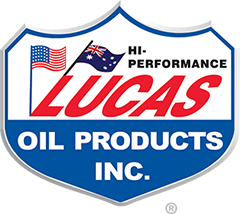
Lucas Oil Products are manufacturers of an extensive range of Heavy Duty and High Performance Oils, problem solving lubricants and additives for everything automotive & industrial including cars, trucks, motorcycles, racing vehicles (open wheel race cars, drag cars), hydraulic powered machinery & industrial equipment.
Lucas Oil Products of Australia are the wholesale distributors to retail outlets throughout Australia, New Zealand and the Pacific.
Lucas Oil manufactures a premium line of oils, greases and problem solving lubricants and additives. Lucas is a top selling additive line in the American truck stop and consumer automotive industry.
In early 1998 Lucas Oil Products were introduced into Australia and soon became a leader in the oil, fuel, lubricant and additive market, including automotive resellers/truck parts/truckstops/agricultural/heavy earthmoving and of course the high performance market.
The broad knowledge passed on from the USA, Lucas Oil soon became a household name in Australia. It was obvious that everything that happened in Australia – including low sulphur/poor quality fuel and poor lubricating designs – had already been dealt with in the USA 10 years earlier.
The Lucas range of products are especially suitable to the Australian trucking industry where large distances are covered through varying climates and conditions.
Lucas Oil Products of Australia is a well established and growing company with representation in all Australian states and territories and throughout the Pacific region including New Zealand, Papua New Guinea, Fiji and the surrounding Pacific Islands.
As sales in Australia and the Pacific increase, so does Lucas Oil's committment to Motorsport sponsorship and community events. Lucas Oil remains committed to producing only the highest quality premium automotive, heavy duty, industrial and specialty oil products. Lucas's success is built upon hard work, an unparalleled line of premium products and an unwavering commitment to customer satisfaction. This single formula for success will continue to guide Lucas Oil Products.
As the slogan says “Keep That Engine Alive” with Lucas Oil Products.
The Lucas Oil Story
Lucas Oil Products was founded by Forrest Lucas and his wife Charlotte in 1989. Prior to that, Forrest was a truck driver for over 20 years. He and Charlotte were also the owners of a nationwide long haul trucking fleet. They experienced first hand the need for better lubricants and fuel treatments to maintain their own fleet.
Given their personal experience in the trucking industry, Forrest and Charlotte started Lucas Oil Products with the simple philosophy of producing only the best line of lubricants and additives available anywhere. Since its inception, Lucas has steadfastly adhered to this corporate objective. Through innovative product research and development, along with aggressive marketing programs, Lucas has established itself as a top selling additive line in the American truck stop industry.
Lucas is also the number one additive line in the automotive aftermarket industry. A premium line of oils, greases and problem solving additives has helped to firmly establish Lucas as the leader in this marketplace.
Lucas also produces a heavy duty line of products for the industrial and agricultural markets. President Forrest Lucas sums it up, "Our forte' is to make better products for industries and specialty situations that are not having their needs completely satisfied by other oil products and, believe me, the major oil companies have left a lot of weak spots. We have an excellent staff and a world of technology which we have gained through years of research. Together we have done a great deal in a short period of time and we intend to do a lot more."
Lucas has long been directly involved in the American racing industry through multiple vehicle sponsorships and racing event promotions, at all levels. Seeing a need for better lubricants in this industry, the Lucas people went to work again. The end result being a line of high performance engine oils and gear oils that are second-to-none in the racing industry. Lucas racing products have proven themselves on NASCAR, NHRA, IHRA, USHRA and ATPA tracks across the country.
The Lucas success story has been built upon hard work, an unparalleled line of premium products and an unwavering commitment to customer satisfaction. This single formula for success will continue to guide Lucas Oil Products as it grows in the years to come.
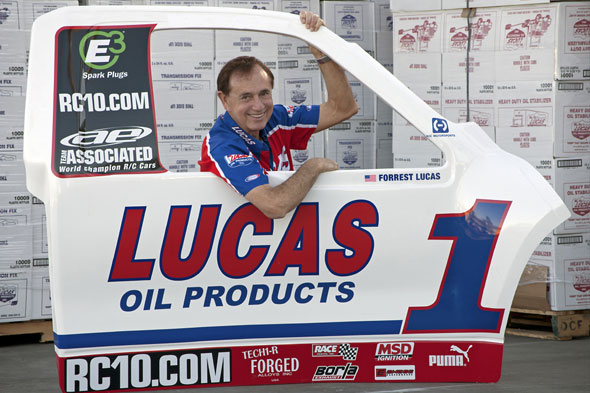
First Round of 2016 Chili Bowl Entries at 144 and Counting
Written by Lucas Oil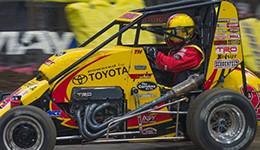
As Andy Williams sang, "It's the most wonderful time of the year," but let's face it; were not talking about Christmas. Almost as anticipated as the first night of racing is the first glimpse at the roster of Golden Driller hopefuls.
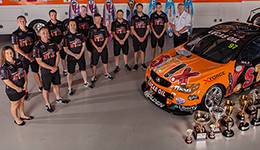
Lucas Oil’s Shane van Gisbergen delivered the perfect parting gift to TEKNO Autosports, winning the final V8 Supercars race of the year at the Coates Hire Sydney 500.
Lucas Oil to Launch Worldwide Racing TV Network
Written by Lucas Oil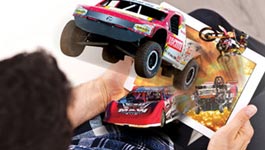 Lucas Oil has announced the worldwide launch of LucasOilRacing.TV, the first streaming TV network dedicated solely to the world of motorsports - 24 hours a day, 7 days a week.
Lucas Oil has announced the worldwide launch of LucasOilRacing.TV, the first streaming TV network dedicated solely to the world of motorsports - 24 hours a day, 7 days a week.

